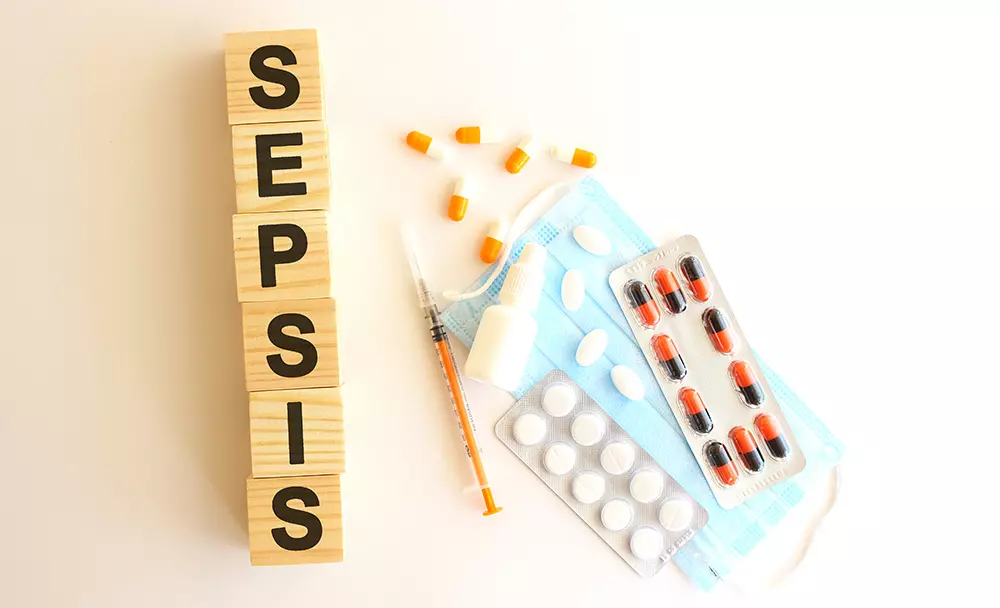Sepsis is a medical emergency that occurs when your body’s response to an infection goes into overdrive. It can cause tissue damage, organ failure, and even death if left untreated. This condition can happen to anyone, but certain individuals are at higher risk (1).
Let’s explore the causes, symptoms, diagnosis, treatment and prevention of sepsis in this article.
What Causes Sepsis (1)?
Sepsis occurs when an infection you already have triggers a chain reaction throughout your body.
Although bacterial infections are the most common cause, other types of infections can also lead to sepsis. These infections are often found in the lungs, stomach, kidneys, or bladder.
It’s also possible for sepsis to begin with a small cut that gets infected or an infection that develops after surgery. Sometimes, sepsis can even occur in people who didn’t even know they had an infection.
Who Is at Risk for Sepsis (1)?
Anyone with an infection could get sepsis. However, certain people are at higher risk. This includes adults 65 or older, people with chronic conditions such as diabetes, lung disease, cancer, and kidney disease, people with weakened immune systems, pregnant women, and children younger than one.
What Are the Symptoms of Sepsis (1)?
Sepsis can cause a range of symptoms, including:
- Rapid breathing and heart rate
- Shortness of breath
- Confusion or disorientation
- Extreme pain or discomfort
- Fever, shivering, or feeling very cold
- Clammy or sweaty skin
It’s crucial to seek medical attention right away if you suspect you have sepsis or if your infection is not improving or getting worse.
What Other Problems Can Sepsis Cause (1)?
In severe cases, sepsis can lead to septic shock. This condition occurs when your blood pressure drops to a dangerous level and multiple organs fail.
How Is Sepsis Diagnosed (1)?
Your healthcare provider will first inquire about your symptoms and medical history, They will then use various tools to diagnose sepsis, such as:
- A physical exam, which may include checking of vital signs, such as your temperature, blood pressure, heart rate, and breathing
- Lab tests and imaging tests such as an X-ray or a CT scan
Remember, sometimes sepsis can be difficult to diagnose in its early stages since several other medical conditions can also cause similar signs and symptoms.
What Are the Treatments for Sepsis (1)?
It’s vital to get treatment for sepsis right away. Treatment often includes:
- Antibiotics
- Maintaining blood flow to organs, which may involve getting oxygen and intravenous (IV) fluids
- Treating the source of the infection
- If necessary, medications to increase blood pressure
In severe cases, kidney dialysis or a breathing tube may be necessary. Some people may require surgery to remove tissue damaged by the infection.
Can Sepsis be Prevented (1)?
To reduce the risk of sepsis, you should take preventive measures to avoid getting an infection. This includes:
- Properly managing chronic health conditions
- Getting recommended vaccinations
- Practising good hygiene, such as regular handwashing
- Keeping cuts clean and covered until they heal
On a Final Note
Sepsis is a severe medical emergency that can lead to life-threatening complications. Early diagnosis and prompt treatment are essential for a successful outcome. If you or someone you know is experiencing symptoms of sepsis, seek medical attention immediately. Taking steps to prevent infection is also essential for reducing the risk of sepsis.
Disclaimer: This article is written from a health & lifestyle perspective. Please consult a trained medical practitioner at all times. These are general information only and are not intended to replace professional advice or treatment.
References
- https://medlineplus.gov/sepsis.html
Other References Used for Research
- https://www.cdc.gov/sepsis/what-is-sepsis.html
- https://www.who.int/news-room/fact-sheets/detail/sepsis


















